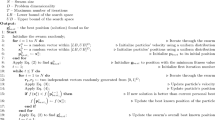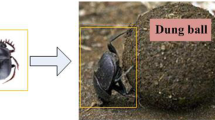Abstract
Population-based global optimization algorithms often need few computational costs to find good regions which contain potential optima, while much more are needed to refine them for higher accuracies in the computationally expensive optimization problems. Such phenomenon is termed “asymptotic inefficiency” phenomenon in this paper. Inspired by the great success of bilevel or multilevel algorithms in eliminating similar phenomenon, we present the bilevel-search framework to alleviate the “asymptotic inefficiency” and apply it to SPSO2011. The main features of the proposed framework adopted to SPSO2011 are: (1) the order-2 stable in the theory and (2) the simple but efficient bilevel-search framework. The extensive numerical experiments show that the proposal framework successfully alleviates the “asymptotic inefficiency” of SPSO2011, and the proposal is a promising global optimization algorithm compared with two popular particle swarm optimization algorithms.










Similar content being viewed by others
Data availability
The data used to support the findings of this study are available from the corresponding author upon request.
References
Banks A, Vincent J, Anyakoha C (2007) A review of particle swarm optimization, part i: background and development. Nat Comput 6:467–484
Banks A, Vincent J, Anyakoha C (2008) A review of particle swarm optimization, part II: hybridisation, combinatorial, multicriteria and constrained optimization, and indicative application. Nat Comput 7:109–124
Bao H, Han F (2017) A hybrid multi-swarm PSO algorithm based on shuffled frog leaping algorithm. Intelligence science and big data engineering. Springer, Cham, pp 101–112
Ben Ali A, Luque G, Alba E (2020) An efficient discrete PSO coupled with a fast local search heuristic for the DNA fragment assembly problem. Inf Sci 512:880–908
Bonyadi MR, Michalewicz Z (2016) Stability analysis of the particle swarm optimization without stagnation assumption. IEEE Trans Evol Comput 20:814–819
Bonyadi MR, Michalewicz Z (2017) Particle swarm optimization for single objective continuous space problems: a review. Evol Comput 25:1–54
Briggs W, Henson VE, McCormick S (2000) A multigrid tutorial. SIAM, Philadelphia
Chugh T, Jin Y, Miettinen K, Hakanen J, Sindhya K (2018) A surrogate-assisted reference vector guided evolutionary algorithm for computationally expensive many-objective optimization. IEEE Trans Evol Comput 22(1):129–142
Cleghorn CW, Engelbrecht AP (2018) Particle swarm stability: a theoretical extension using the non-stagnate distribution assumption. Swarm Intell 12:1–22
Clerc M (2011) Clerc M (2011) Standard particle swarm optimization: from 2006 to 2011. http://clerc.maurice.free.fr/pso/
Clerc M, Kennedy J (2002) The particle swarm: explosion, stability, and convergence in a multidimensional complex space. IEEE Trans Evol Comput 6(1):58–73
Dong WY, Zhang RR (2019) Order-3 stability analysis of particle swarm optimization. Inf Sci 503:508–520
Eberhart RC, Kennedy J (1995) A new optimizer using particle swarm theory. In: The sixth international symposium on micro machine and human science, Nagoya, Japan, Piscataway, IEEE, pp 39–43
Floudas CA, Gounaris CE (2009) A review of recent advances in global optimization. J Global Optim 45:3–38
Hedar A (2005) Hedar test set. http://www-optima.amp.i.kyoto-u.ac.jp/member/student/hedar/Hedar$_$files/TestGO.htm
Higham NJ (1993) Optimization by direct search in matrix computions. SIAM J Matrix Anal Appl 14(2):317–333
Hussain MM, Fujimoto N (2018) Parallel multi-objective particle swarm optimization for large swarm and high dimensional problems. In: 2018 IEEE congress on evolutionary computation (CEC), pp 1–10
Huyer W, Neumaier A (1999) Global optimization by multilevel coordinate search. J Global Optim 14(4):331–335
Jones DR, Perttunen CD, Stuckman BE (1993) Lipschitzian optimization without the lipschitz constant. J Optim Theory Appl 79:157–181
Liang JJ, Qu BY, Suganthan PN (2013) Problem definitions and evaluation criteria for the CEC 2013 special session and competition on real-parameter optimization. Technical report 201212, Computational Intelligence Laboratory, Zhengzhou University, Zhengzhou China and Nanyang Technological University, Singapore
Li D, Guo W, Wang L, Chen M (2016) Particle swarm optimization-based solution updating strategy for biogeography-based optimization. In: 2016 IEEE congress on evolutionary computation (CEC), pp 455–459
Liu Q (2011) Two minimal positive bases based direct search conjugate gradient methods for computationally expensive functions. Numer Algorithms 58(4):461–474
Liu Q (2015a) Order-2 stability analysis of particle swarm optimization. Evol Comput 23:187–216
Liu Y (2015b) Optimization problems in partial differential equations. PhD thesis, University of Liverpool
Liu Q, Zeng J (2010) Convergence analysis of multigrid methods with residual scaling techniques. J Comput Appl Math 234(10):2932–2942
Liu Q, Cheng W (2014) A modified DIRECT algorithm with bilevel partition. J Global Optim 60:483–499
Liu Q, Zeng J (2015) Global optimization by multilevel partition. J Global Optim 61:47–69
Liu Q, Yan Y (2021) Global optimization: new methods based on recursive deep swarm search. Tsinghua University Press, Beijing
Liu B, Chen Y, Zhang Q, Liang JJ, Suganthan PN, Qu BY (2013) Problem definitions and evaluation criteria for computationally expensive single objective numerical optimization. Technical report, Computational Intelligence Laboratory, Zhengzhou University, Zhengzhou China And Technical Report, Nanyang Technological University, Singapore
Liu B, Zhang Q, Gielen GGE (2014) A gaussian process surrogate model assisted evolutionary algorithm for medium scale expensive optimization problems. IEEE Trans Evol Comput 18(2):180–192
Liu Q, Zeng J, Yang G (2015) MrDIRECT: a multilevel robust direct algorithm for global optimization problems. J Global Optim 62:205–227
Liu Q, Wei W, Yuan H, Zhan ZH, Li Y (2016) Topology selection for particle swarm optimization. Inf Sci 363:154–173
Liu Q, Chen WN, Deng JD, Gu T, Zhang H, Yu Z, Zhang J (2017a) Benchmarking stochastic algorithms for global optimization problems by visualizing confidence intervals. IEEE Trans Cybern 47:2924–2937
Liu Q, Yang G, Zhang Z, Zeng J (2017b) Improving the convergence rate of the DIRECT global optimization algorithm. J Global Optim 67:851–872
Liu XF, Zhan ZH, Gao Y, Zhang J, Kwong S, Zhang J (2019a) Coevolutionary particle swarm optimization with bottleneck objective learning strategy for many-objective optimization. IEEE Trans Evol Comput 23(4):587–602
Liu Y, Lu H, Cheng S, Shi Y (2019b) An adaptive online parameter control algorithm for particle swarm optimization based on reinforcement learning. In: 2019 IEEE congress on evolutionary computation (CEC), pp 815–822
Martino FD, Sessa S (2020) Pso image thresholding on images compressed via fuzzy transforms. Inf Sci 506:308–324
Min ATW, Ong YS, Gupta A, Goh CK (2019) Multiproblem surrogates: transfer evolutionary multiobjective optimization of computationally expensive problems. IEEE Trans Evol Comput 23(1):15–28
Moré J, Wild S (2009) Benchmarking derivative-free optimization algorithms. SIAM J Optim 20:172–191
Parrott D, Xiaodong Li (2004) A particle swarm model for tracking multiple peaks in a dynamic environment using speciation. In: Proceedings of the 2004 congress on evolutionary computation (IEEE Cat. No.04TH8753), vol 1, pp 98–103
Poli R (2009) Mean and variance of the sampling distribution of particle swarm optimizers during stagnation. IEEE Trans Evol Comput 13:712–721
Poli R, Kennedy J, Blackwell T (2007) Particle swarm optimization: an overview. Swarm Intell 1:33–57
Shi YH (2011) Brain storm optimization algorithm. In: Advances in swarm intelligence, pp 303–309
Storn R, Price KV (1995) Differential evolution: a simple and efficient adaptive scheme for global optimization over continuous spaces. Technical report, ICSI, USA, TR-95-012
Stübeben K (2001) A review of algebraic multigrid. J Comput Appl Math 128(1):281–309
Sultanova N (2010) A class of increasing positively homogeneous functions for which global optimization problem is np-hard. Dyn Continu Discrete Impuls Syst Ser B Appl Algorithms 17:723–739
Sun C, Jin Y, Cheng R, Ding J, Zeng J (2017) Surrogate-assisted cooperative swarm optimization of high-dimensional expensive problems. IEEE Trans Evol Comput 21(4):644–660
Wang Z, Zhan Z, Du K, Yu Z, Zhang J (2016) Orthogonal learning particle swarm optimization with variable relocation for dynamic optimization. In: 2016 IEEE congress on evolutionary computation (CEC), pp 594–600
Wang ZJ, Zhan ZH, Yu WJ, Lin Y, Zhang J, Gu TL, Zhang J (2020) Dynamic group learning distributed particle swarm optimization for large-scale optimization and its application in cloud workflow scheduling. IEEE Trans Cybern 50(6):2715–2729
Wei B, Xia X, Yu F, Zhang Y, Xu X, Wu H, Gui L, He G (2020) Multiple adaptive strategies based particle swarm optimization algorithm. Swarm Evol Comput 57:100731
Wu SH, Zhan ZH, Zhang J (2021) Safe: scale-adaptive fitness evaluation method for expensive optimization problems. IEEE Trans Evol Comput 25(3):478–491
Xia X, Gui L, Zhan ZH (2018) A multi-swarm particle swarm optimization algorithm based on dynamical topology and purposeful detecting. Appl Soft Comput 67:126–140
Xia X, Gui L, He G, Wei B, Zhang Y, Yu F, Wu H, Zhan ZH (2020a) An expanded particle swarm optimization based on multi-exemplar and forgetting ability. Inf Sci 508:105–120
Xia X, Gui L, Yu F, Wu H, Wei B, Zhang YL, Zhan ZH (2020b) Triple archives particle swarm optimization. IEEE Trans Cybern 50(12):4862–4875
Xu J (1997) An introduction to multilevel methods. Oxford University Press, Oxford
Yan Y, Liu Q (2021) A modified data profile technology for optimization algorithms competition. J Dongguan Univ Technol 28(1):31–37
Yu H, Tan Y, Sun C, Zeng J (2017) Clustering-based evolution control for surrogate-assisted particle swarm optimization. In: 2017 IEEE congress on evolutionary computation (CEC), pp 503–508
Zhang X, Du KJ, Zhan ZH, Kwong S, Gu TL, Zhang J (2020) Cooperative coevolutionary bare-bones particle swarm optimization with function independent decomposition for large-scale supply chain network design with uncertainties. IEEE Trans Cybern 50(10):4454–4468
Funding
This work was supported in part by the National Science Fund of China under Grant 61773119, part of the Key Project of Science and Technology Innovation 2030 supported by the Ministry of Science and Technology of China under Grant 2018AAA0101300, and in part by the Guangdong Universities’ Special Projects in Key Fields of the Natural Science under Grant 2019KZDZX1005.
Author information
Authors and Affiliations
Contributions
YY was involved in writing—original, visualization, data curation, resources, formal analysis, methodology, and software. QZ contributed to software. SC was involved in writing—review and editing. QL was involved in conceptualization and writing—review and editing. YL was involved in supervision.
Corresponding author
Ethics declarations
Conflict of interest
The authors declare that they have no conflict of interest.
Additional information
Publisher's Note
Springer Nature remains neutral with regard to jurisdictional claims in published maps and institutional affiliations.
This work was supported in part by the National Science Fund of China under Grant 61773119, part of the Key Project of Science and Technology Innovation 2030 supported by the Ministry of Science and Technology of China under Grant 2018AAA0101300, and in part by the Guangdong Universities’ Special Projects in Key Fields of the Natural Science under Grant 2019KZDZX1005.
Rights and permissions
About this article
Cite this article
Yan, Y., Zhou, Q., Cheng, S. et al. Bilevel-search particle swarm optimization for computationally expensive optimization problems. Soft Comput 25, 14357–14374 (2021). https://doi.org/10.1007/s00500-021-06169-3
Accepted:
Published:
Issue Date:
DOI: https://doi.org/10.1007/s00500-021-06169-3




